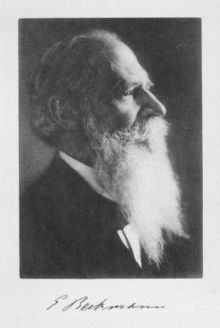Ernst Otto Beckmann
| Ernst Otto Beckmann | |
|---|---|

Ernst Beckmann
|
|
| Born |
July 4, 1853 Solingen, Germany |
| Died | July 12, 1923 (aged 70) Dahlem, Germany |
| Doctoral advisor | Hermann Kolbe |
| Known for |
Beckmann rearrangement Beckmann thermometer |
Ernst Otto Beckmann (July 4, 1853 – July 12, 1923) was a German pharmacist and chemist who is remembered for his invention of the Beckmann differential thermometer and for his discovery of the Beckmann rearrangement.
Ernst Otto Beckmann was born in Solingen, Germany on July 4, 1853 to a family headed by Johannes Friedrich Wilhelm Beckmann, a manufacturer. The elder Beckmann's factory produced mineral dyes, pigments, abrasives, and polishing material, and it was there that the younger Beckmann conducted his early chemical experiments. At the age of 17, Beckmann was persuaded by his father to study pharmacy instead of chemistry, and so in 1870 an apprenticeship was arranged in Elberfeld. However, Beckmann did not enjoy the working conditions and returned home, to his father's disappointment. Told that a chemical career would be difficult if could not handle an apprenticeship in pharmacy, Beckmann then returned to Elberfeld to finish his work. He also worked at pharmacies in Arolsen, Burg an der Wupper, Leipzig, and Cologne.
To improve his theoretical skills, in 1874 Beckmann joined the school of Remigius Fresenius in Wiesbaden, and moved to the University of Leipzig the following year when Fresenius became a professor there. At Leipzig, Beckmann came into contact with the renowned chemist Hermann Kolbe. Although Beckmann wanted to study chemistry, he finished his studies with Fresenius, passing his pharmacy examination in 1877. He then joined Kolbe, and his assistant, Ernst von Meyer, and started work on the oxidation of dialkyle sulfides. For this research Beckmann received his PhD in July 1878.
After a year of voluntary military service, as a pharmacist, Beckmann began studying toxicology at the TU Braunschweig with Robert Otto, receiving his habilitation in 1882. He returned to Leipzig and wanted to work as a lecturer with Kolbe, but the habilitation at a technical university was not a sufficient qualification for such a position. For a habilitation at a university an abitur from a humanistic gymnasium was necessary, and for this Latin language skills were obligatory. Therefore, Beckmann again began studying, and was able to complete the necessary exams in Latin, Greek language, and history in 1883, and again work at Leipzig. Kolbe died in 1884 and was succeeded by one of his critics, Johannes Wislicenus. This might have threatened Beckmann's academic career, but contrary to expectations the two chemists became colleagues and friends.
...
Wikipedia
